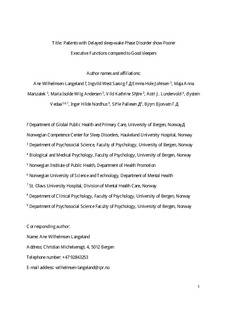| dc.contributor.author | Wilhelmsen-Langeland, Ane | |
| dc.contributor.author | Saxvig, Ingvild W. | |
| dc.contributor.author | Johnsen, Emma Hole | |
| dc.contributor.author | Marszalek, Maja Anna | |
| dc.contributor.author | Andersen, Maria Isolde Wiig | |
| dc.contributor.author | Sætre, Vild Katrine | |
| dc.contributor.author | Lundervold, Astri | |
| dc.contributor.author | Vedaa, Øystein | |
| dc.contributor.author | Nordhus, Inger Hilde | |
| dc.contributor.author | Pallesen, Ståle | |
| dc.contributor.author | Bjorvatn, Bjørn | |
| dc.date.accessioned | 2020-02-10T07:14:49Z | |
| dc.date.available | 2020-02-10T07:14:49Z | |
| dc.date.created | 2019-04-18T14:20:37Z | |
| dc.date.issued | 2019 | |
| dc.identifier.citation | Sleep Medicine. 2019, 54 244-249. | nb_NO |
| dc.identifier.issn | 1389-9457 | |
| dc.identifier.uri | http://hdl.handle.net/11250/2640536 | |
| dc.description.abstract | Objective
Delayed Sleep-Wake Phase Disorder (DSWPD) is associated with negative outcomes, including reduced daytime performance and difficulties with treatment adherence. These outcomes are mediated by executive functions (EF). In this study, we investigated whether patients with DSWPD report inferior EF compared to a control group. The study consisted of 40 patients diagnosed with DSWPD (12 males, mean age 20.7 (±3.1)) and 20 healthy controls (six males, 21.3 (±2.2), p = 1.00) between 16 and 25 years (p = 0.42).
Methods
Behavior Rating Inventory of Executive Function-Adult version Self-Report (BRIEF-A) was used for adults ≥18 years (DSWPD n = 28; controls n = 17) whereas Behavior Rating Inventory of Executive Function Self-Report Version (BRIEF-SR) was used for assessment of EF in adolescents <18 years (DSWPD n = 12; controls n = 3). Independent samples t-tests were used to compare patients to controls.
Results
The total group of patients with DSWPD scored significantly poorer compared to the control group on the main indexes; Behavioral Regulation Index (BRI) (p = <0.0005), Metacognition Index (MI) (p = <0.0005), and Global Executive Composite (GEC) (p = <0.0005). The adult group with DSWPD scored significantly poorer than the adult control group on eleven of the twelve BRIEF-A scales. Among patients <18 years, the DSWPD-group scored significantly poorer than the control group on 8 of the 13 BRIEF-SR-scales.
Conclusion
Patients with DSWPD reported significantly poorer EF compared to controls. Assessment of EF in patients with DSWPD can be valuable for understanding the consequences of the disorder regarding treatment tailoring and adherence. | nb_NO |
| dc.language.iso | eng | nb_NO |
| dc.publisher | Elsevier | nb_NO |
| dc.rights | Attribution-NonCommercial-NoDerivatives 4.0 Internasjonal | * |
| dc.rights.uri | http://creativecommons.org/licenses/by-nc-nd/4.0/deed.no | * |
| dc.title | Patients with delayed sleep-wake phase disorder show poorer executive functions compared to good sleepers | nb_NO |
| dc.type | Journal article | nb_NO |
| dc.type | Peer reviewed | nb_NO |
| dc.description.version | acceptedVersion | nb_NO |
| dc.source.pagenumber | 244-249 | nb_NO |
| dc.source.volume | 54 | nb_NO |
| dc.source.journal | Sleep Medicine | nb_NO |
| dc.identifier.doi | 10.1016/j.sleep.2018.10.035 | |
| dc.identifier.cristin | 1693143 | |
| dc.description.localcode | © 2018. This is the authors’ accepted and refereed manuscript to the article. Locked until 24 November 2019 due to copyright restrictions. This manuscript version is made available under the CC-BY-NC-ND 4.0 license http://creativecommons.org/licenses/by-nc-nd/4.0/ | nb_NO |
| cristin.unitcode | 194,65,35,0 | |
| cristin.unitcode | 1920,25,0,0 | |
| cristin.unitname | Institutt for psykisk helse | |
| cristin.unitname | PH - Østmarka psykiatriske avdeling | |
| cristin.ispublished | true | |
| cristin.fulltext | postprint | |
| cristin.qualitycode | 1 | |

